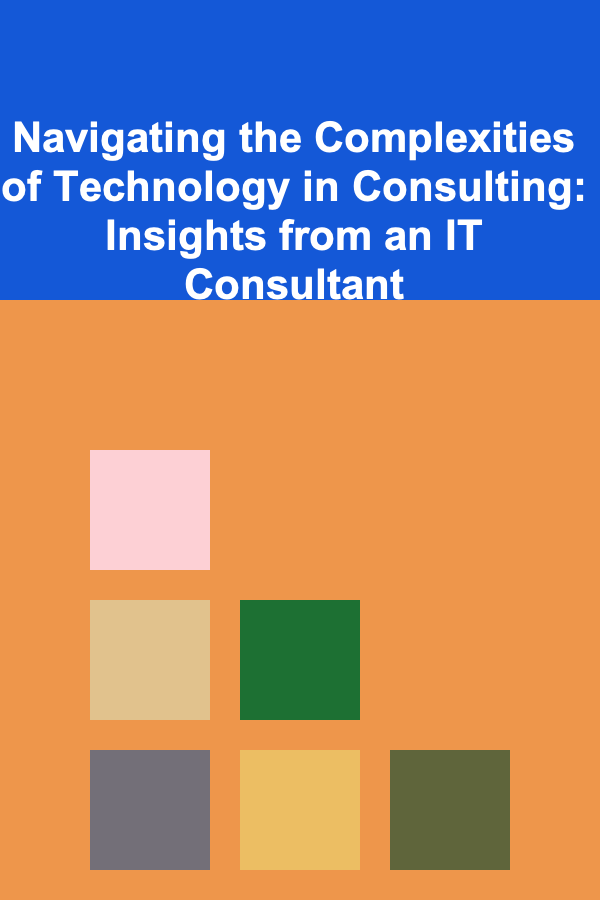
Navigating the Complexities of Technology in Consulting: Insights from an IT Consultant
ebook include PDF & Audio bundle (Micro Guide)
$12.99$11.99
Limited Time Offer! Order within the next:

The consulting industry has been profoundly influenced by the rapid evolution of technology. In today's highly interconnected and digital-first world, IT consultants must grapple with an increasingly complex array of technologies, challenges, and client expectations. As businesses strive to stay ahead of the curve, consultants are tasked not only with recommending solutions but also with delivering lasting value in an ever-shifting technological landscape. This article offers deep insights into the challenges of technology consulting, and provides actionable strategies that IT consultants can implement to successfully navigate these complexities.
The Dynamic Landscape of Technology Consulting
Technology consulting, at its core, involves helping businesses understand and leverage technology to achieve their goals. However, the scope of this role has expanded dramatically as technology itself has evolved. From cloud computing and artificial intelligence to cybersecurity and blockchain, consultants are no longer just supporting legacy systems but are often at the forefront of transforming business models. The complexities arise when businesses are forced to balance cutting-edge innovations with established infrastructure, requiring consultants to act as both technical advisors and change agents.
Key Drivers of Complexity
- Rapid Technological Advancements: Every year, new technologies emerge that promise to disrupt existing business models. For consultants, staying updated on these innovations while integrating them into existing frameworks is a constant challenge.
- Diverse Client Needs: Different clients come with different levels of technological maturity. While some may need help digitizing processes, others might be looking to incorporate the latest AI or blockchain into their operations.
- Budget and ROI Pressure: As businesses invest more in technology, consultants are increasingly tasked with ensuring that these investments yield measurable results. This adds a layer of complexity as consultants must justify every recommendation with a clear ROI.
- Cybersecurity and Data Privacy: With the increasing volume of sensitive data being processed, cybersecurity and data privacy concerns have become paramount. Consultants must not only recommend solutions that are technologically sound but also secure.
Building a Strong Foundation in Technology Consulting
To successfully navigate these complexities, IT consultants must first build a strong foundation. This involves not only understanding the technical aspects of various technologies but also developing a keen awareness of the business context in which these technologies are being applied.
Understanding the Client's Business Context
Before jumping into the technical solutions, it's critical to deeply understand the client's business. This means getting to grips with their goals, challenges, industry trends, and competitive pressures. A deep understanding of the client's pain points will inform the solutions you recommend and ensure that they align with the overall business objectives.
Actionable Strategy:
- Conduct Stakeholder Interviews: Set up interviews with key business leaders and stakeholders to understand their vision and priorities. Get input not just from the IT team but also from sales, marketing, finance, and other departments.
- Analyze Current Systems: Perform a thorough analysis of the client's existing technology stack. Identify inefficiencies or opportunities for improvement that technology can address.
- Use Frameworks: Leverage frameworks like Porter's Five Forces, PESTLE, and SWOT analysis to understand the broader business environment and pinpoint technological needs.
Bridging the Gap Between Business and Technology
IT consultants often serve as the bridge between business stakeholders and technology teams. A key challenge here is translating complex technical jargon into business-friendly language that decision-makers can understand and act on. Additionally, consultants need to communicate the business value of technological solutions in clear, tangible terms.
Actionable Strategy:
- Translate Technical Details into Business Impact: When proposing solutions, focus on how the technology will directly impact business outcomes. For instance, instead of talking about the intricacies of a cloud infrastructure, explain how it will reduce costs, enhance scalability, and improve operational efficiency.
- Create Executive Dashboards: Develop simplified dashboards that present key metrics in a way that non-technical stakeholders can quickly interpret. Tools like Power BI or Tableau are excellent for creating visual reports that highlight the financial benefits of a technology adoption.
Selecting and Implementing the Right Technology
Once you've understood the business needs, the next step is selecting the right technology solutions. Given the broad range of available options, this can be one of the most complex aspects of technology consulting.
Evaluating Technology Solutions
Choosing the right technology involves balancing several factors, including cost, scalability, security, and alignment with the client's long-term goals. Consultants must also be mindful of the client's existing infrastructure, ensuring that new solutions integrate seamlessly with legacy systems.
Actionable Strategy:
- Conduct a Thorough Technology Assessment: Before recommending any technology, evaluate it thoroughly. Look at scalability, compatibility with existing systems, and total cost of ownership (TCO). Consider future upgrades and integration needs.
- Run Pilot Programs: Whenever possible, test the proposed solution in a smaller, controlled environment before full-scale implementation. This allows clients to see firsthand the potential benefits (and challenges) of the solution.
Managing Change and Minimizing Disruption
The implementation of new technologies can disrupt existing workflows, making change management a critical component of the consulting process. Ensuring that the transition is smooth and that employees are properly trained is crucial to the success of any technology adoption.
Actionable Strategy:
- Develop a Change Management Plan: Create a clear change management strategy that includes communication plans, training programs, and feedback loops. Ensure that the entire organization is on board with the changes.
- Leverage Champions: Identify and empower key internal advocates who can champion the new technology within the organization. These champions will help in promoting the benefits and assisting their peers during the transition.
Ensuring Cybersecurity and Data Privacy
Cybersecurity is an increasingly critical issue in consulting. With businesses handling more sensitive data, ensuring that any new technology meets the highest standards of security is non-negotiable.
Actionable Strategy:
- Adopt a Security-First Approach: When recommending technology solutions, prioritize cybersecurity. Ensure that all tools are equipped with the latest encryption, authentication, and authorization features.
- Regular Security Audits: Regularly audit the client's systems to identify vulnerabilities and stay ahead of potential threats. Tools like vulnerability scanners and penetration testing should be incorporated into ongoing security practices.
- Data Privacy Compliance: Make sure that all recommended solutions comply with data privacy laws like GDPR, CCPA, or HIPAA. This may involve collaborating with legal and compliance teams to ensure full adherence to relevant regulations.
Building Trust and Long-Term Relationships with Clients
The complexities of technology consulting don't end with a successful project implementation. Building long-term, trusted relationships with clients is key to growing your consulting business and securing repeat engagements.
Providing Ongoing Support
Technology is constantly evolving, and businesses require continuous support to keep systems optimized and secure. By offering ongoing support services, consultants can add value long after the initial implementation.
Actionable Strategy:
- Offer Post-Implementation Monitoring: After the solution has been implemented, ensure that there is a period of active monitoring and support. This allows you to catch any issues early and make adjustments as needed.
- Offer Managed Services: Consider offering managed services, where you take on the responsibility for maintaining and improving the client's systems on an ongoing basis.
Fostering a Culture of Continuous Improvement
Consulting is an iterative process. As businesses grow and technology continues to evolve, the solutions you recommend today may need to be reassessed tomorrow. Fostering a culture of continuous improvement helps both you and your clients stay ahead of the competition.
Actionable Strategy:
- Conduct Regular Performance Reviews: Set up quarterly or annual performance reviews with clients to assess how well the technology is meeting business objectives. Use this time to identify areas for further improvement.
- Stay Updated on Emerging Trends: Technology never stops evolving. Attend conferences, webinars, and other industry events to stay informed about the latest trends and innovations. This allows you to offer forward-thinking advice to your clients.
Conclusion
Navigating the complexities of technology in consulting requires a deep understanding of both the technical and business aspects of each engagement. By adopting a strategic, client-centric approach, IT consultants can not only recommend the best technological solutions but also ensure that these solutions are seamlessly integrated into the client's operations and aligned with their long-term goals. From selecting the right technology to managing change and ensuring security, consultants play a crucial role in helping businesses thrive in an increasingly digital world. By continually refining their skills and staying ahead of emerging trends, IT consultants can provide invaluable insights and drive lasting impact for their clients.

Common Remote Jobs You Might Not Know About
Read More
Effective Strategies for Cutting Down on Impulse Online Shopping
Read More
How to Exercise Your Pet Indoors When the Weather is Bad
Read More
How to Maintain Outdoor Appliances Like Grills
Read More
How to Organize Family Art Exhibitions at Home
Read More
How to Soundproof Windows Without Replacing Them
Read MoreOther Products

Common Remote Jobs You Might Not Know About
Read More
Effective Strategies for Cutting Down on Impulse Online Shopping
Read More
How to Exercise Your Pet Indoors When the Weather is Bad
Read More
How to Maintain Outdoor Appliances Like Grills
Read More
How to Organize Family Art Exhibitions at Home
Read More